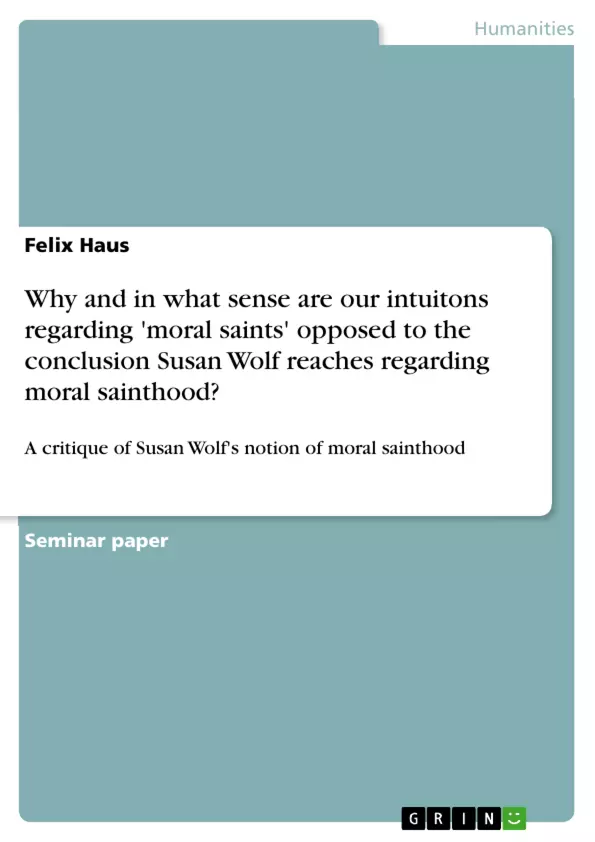This paper offers a critique of Susan Wolfs thesis that it is not desirable to be as morally good as possible. I will mainly focus on two objections that are strongly connected with each other. The first one being the notion of free will, that is, that one can only be a moral saint by choice and out of one’s own free will. The secound one is the notion that a moral saint will affect their surroundings in a way that will make up for the possible downsides of moral saintliness.
Table of Contents
- 1. Introduction
- 2. Wolf's Position
- 3. Prior Objections
- 3.1 We Cannot Be Too Moral
- 3.2 What Moral Saints Look Like
- 3.3 The Motivation of the Moral Saint
- 4. The Perks of Being a Saint
- 4.1 Moral Saints As Free Agents
- 4.2 Moral Saints Are Impactful
- 4.3 There Are Many Ways To Well-Roundness
- 5. Conclusion
Objectives and Key Themes
This paper critiques Susan Wolf's 1982 argument against the pursuit of moral sainthood, focusing on two key interconnected points: free will and the positive societal impact of moral saints. It examines existing objections to Wolf's thesis, ultimately arguing that her concept of well-roundedness is too narrow and that fulfillment can be achieved through diverse avenues. The paper aims to demonstrate that moral sainthood, achieved through free will, is not inherently incompatible with a fulfilling and impactful life.
- The compatibility of moral sainthood and free will.
- The societal impact of moral saints.
- The limitations of Wolf's conception of a well-rounded life.
- Critique of existing objections to Wolf's argument.
- Re-evaluation of the concept of moral sainthood.
Chapter Summaries
1. Introduction: The introduction establishes the prevalent notion of moral goodness as a measure of a good life, challenging this idea by introducing Susan Wolf's argument against the pursuit of moral sainthood. It highlights Wolf's contention that a life solely focused on morality might lack essential elements for a well-rounded existence and introduces the paper's main arguments: the importance of free will in achieving moral sainthood and the positive impact of moral saints on their surroundings. The introduction also briefly mentions existing objections to Wolf's thesis, which will be further explored later in the paper.
2. Wolf's position: This section summarizes Wolf's definition of a moral saint as someone whose every action is as morally good as possible. Wolf argues that moral saints, due to their commitment to maximizing general welfare, would lack time and inclination for non-moral pursuits like artistic endeavors or personal hobbies. She distinguishes between loving and rational saints, suggesting potential psychological drawbacks for both. The core of Wolf's argument centers on the perceived incompatibility between a life dedicated solely to morality and a fulfilling, well-rounded life.
3. Prior Objections: This chapter examines existing objections to Wolf's argument, primarily focusing on Robert Louden's critique. Louden challenges Wolf's underlying conception of morality, proposing a "classical view" emphasizing self-perfection over maximizing general welfare. He argues that morality involves cultivating one's natural powers, which necessitates the development of non-moral skills and traits, making Wolf's notion of 'too much morality' untenable. The chapter demonstrates that the objections previously raised against Wolf's position do not fully refute her arguments.
Frequently Asked Questions: A Critique of Susan Wolf's Argument Against Moral Sainthood
What is the main topic of this paper?
This paper critically examines Susan Wolf's 1982 argument against the pursuit of moral sainthood. It focuses on the interconnected themes of free will and the positive societal impact of moral saints, ultimately arguing that Wolf's concept of well-roundedness is too narrow and that fulfillment can be achieved through diverse avenues, including moral sainthood.
What are the key themes explored in the paper?
The paper explores several key themes, including: the compatibility of moral sainthood and free will; the societal impact of moral saints; the limitations of Wolf's conception of a well-rounded life; a critique of existing objections to Wolf's argument; and a re-evaluation of the concept of moral sainthood itself.
What is Susan Wolf's argument against moral sainthood?
Wolf argues that a life solely dedicated to morality, to the extent of a "moral saint," would lack essential elements for a well-rounded and fulfilling existence. She suggests that such a life would leave no room for non-moral pursuits, like artistic endeavors or personal hobbies, potentially leading to a lack of personal fulfillment.
What are the main objections to Wolf's argument discussed in the paper?
The paper examines existing objections to Wolf's argument, particularly focusing on Robert Louden's critique. Louden challenges Wolf's conception of morality, suggesting a "classical view" that emphasizes self-perfection and the cultivation of natural powers, including non-moral skills and traits, thus countering Wolf's notion of "too much morality."
What is the paper's conclusion regarding Wolf's argument?
The paper argues that Wolf's concept of well-roundedness is too narrow. It contends that moral sainthood, achieved through free will, is not inherently incompatible with a fulfilling and impactful life. The paper ultimately suggests that fulfillment can be achieved through diverse avenues, and that the objections to Wolf's position do not fully refute her arguments.
What is the structure of the paper?
The paper is structured as follows: an introduction outlining Wolf's argument and the paper's main points; a summary of Wolf's position; an examination of prior objections; a discussion of the potential benefits of being a moral saint; and a concluding section summarizing the findings.
What are the chapter summaries provided in the preview?
The preview includes detailed summaries of each chapter, outlining the key arguments and points of discussion within each section. These summaries provide a comprehensive overview of the paper's content and flow of arguments.
- Quote paper
- Felix Haus (Author), 2021, Why and in what sense are our intuitons regarding 'moral saints' opposed to the conclusion Susan Wolf reaches regarding moral sainthood?, Munich, GRIN Verlag, https://www.grin.com/document/1164511



